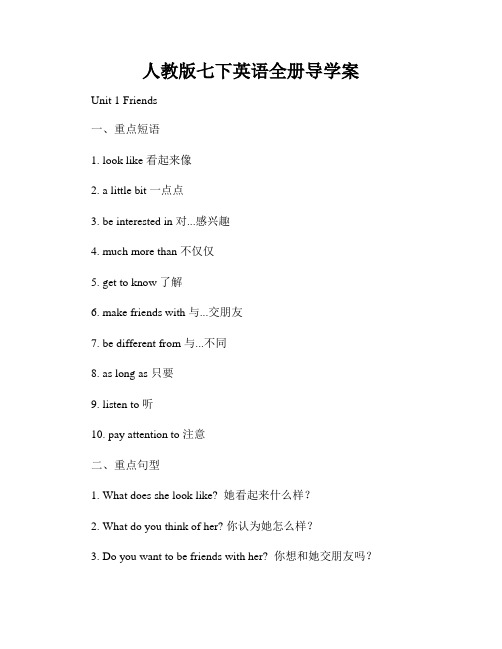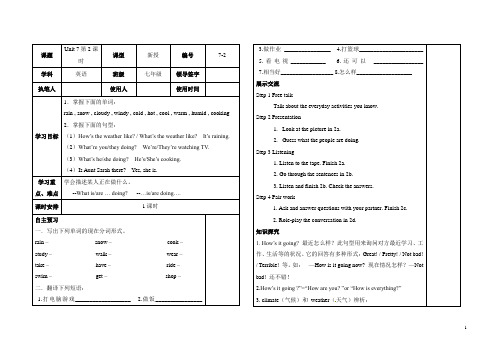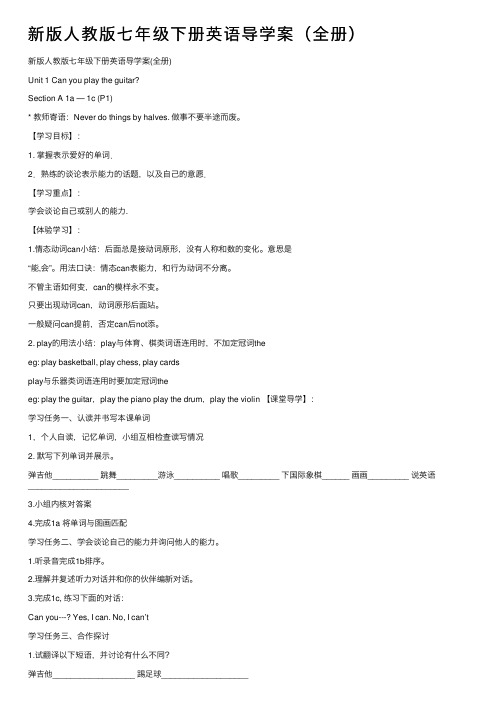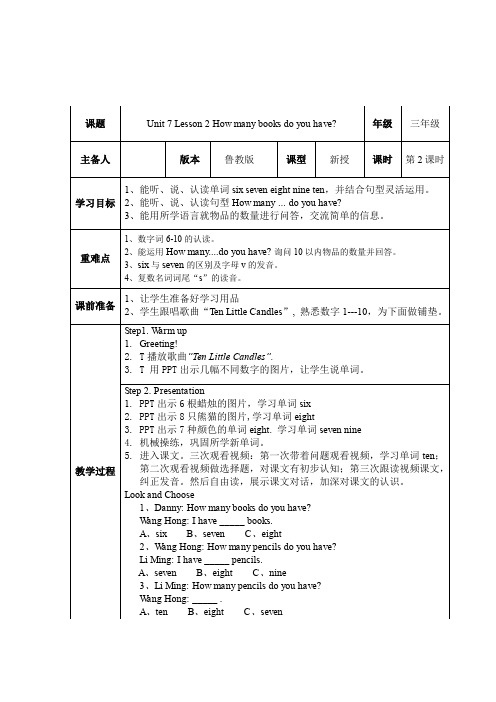【最新】人教版七年级英语下册unit7-2导学案
【免费下载】新人教版七年级英语下册金太阳导学案unit7答案

Unit7 It’s raining. (学生用书)学习目标1、继续学习描绘人们正在做的事情。
学会描述天气。
学会一些简单的电话用语。
2、正确使用现在进行时和一般现在时。
3、善于观察天气,合理安排生活。
Section A (1a-1c )课时重点能用英语正确描述各地各种常见天气。
预习导学——不看不讲1.你能用英语单词写出下列气象符号所代表的天气吗?sunny cloudy raining snowing windy 2.英译汉。
How’s the weather in Shanghai ? 上海的天气如何? It’s cloudy. 天气多云。
It’s sunny. 天气晴朗。
活动一 ①仔细观察P37上1a 的图片,完成单词与图片匹配。
②照例子问和答P37上1a 各图片的天气。
A:How’s the weather in Picture e ?B: It’s cloudy.活动二 ①听P37上1b 的录音一遍,完成1b 中的听力题,②将你所听到的内容复述给同学听听,核对答案。
Beijing is sunny,…③完成P37上1c 的对话练习。
活动三 画出“预习导学1”中你最喜欢的两三种气象符号。
然后和小组成员编对话,看看你们一组的喜好是否相同?A:How is the weather?B:It’s….…知识超市-How’s the weather in Beijing ?北京的天气怎么样?-It’s sunny.天气晴朗。
①询问天气除了用“How’s the weather”外,还可以用“What’s the weather like”。
如,How’s the weather in Moscow?=What’s the weather like in Moscow?莫斯科的天气如何?②在某个大城市,介词用“in”。
如,in London 在伦敦,in Toronto 在多伦多,in Boston 在波斯顿。
人教版七下英语全册导学案

人教版七下英语全册导学案Unit 1 Friends一、重点短语1. look like 看起来像2. a little bit 一点点3. be interested in 对...感兴趣4. much more than 不仅仅5. get to know 了解6. make friends with 与...交朋友7. be different from 与...不同8. as long as 只要9. listen to 听10. pay attention to 注意二、重点句型1. What does she look like? 她看起来什么样?2. What do you think of her? 你认为她怎么样?3. Do you want to be friends with her? 你想和她交朋友吗?4. How do you get on with your classmates? 你和你的同学相处得怎么样?5. I think she is friendly and outgoing. 我认为她友好并且外向。
6. I’m not very outgoing, but I’m very kind. 我不太外向,但是我很善良。
7. As long as she is friendly, I’m happy to make friends with her. 只要她友好,我很高兴和她交朋友。
8. He is different from me, but he gets on well with his classmates. 他和我不同,但是他和他的同学相处得很好。
9. I pay attention to my friend s’ feelings because I think it’s important. 我关注我的朋友的感受,因为我认为这很重要。
三、词汇运用1. 根据句意和首字母提示填入适当的词1) My cousin looks like her father, but she is a l_________ like her mother.2) He is very friendly and o_________. He has many friends.3) My sister is very k________ to everyone and she gets on well with her classmates.4) She is not very o________, but she is very easygoing.5) Nick is different from his brother. He is more i________ in music.2. 选择合适的词填入空格1) My friend is very _________ (outgoing, interested) in basketball and he plays it every day.2) Lucy pays a lot of attention to her _________ (families, friends) because she cares about them.3) My grandfather is very _________ (kind, similar) to all his grandchildren and he loves us very much.4) She is a little bit _________ (friendly, different) from others, but she also has many friends.5) If you want to _________(get to know, make friends) with someone, you need to be friendly and kind.Unit 2 Festivals一、重点短语1. at the beginning of 在...开始时2. send sb. sth. 向某人送去…3. in the west 在西方4. unlike sb./sth. 不同于5. look like 看起来像6. wear costumes 穿着服装7. on the 15th day of the 1st lunar month 农历正月十五8. be similar to 与...相似9. make dumplings 包饺子10. have fun 玩得开心二、重点句型1. What do people do on Mid-Autumn Festival? 中秋节的时候人们做什么?2. Are there any differences among different countries? 不同国家有什么不同之处?3. What do you think of the festival? 你觉得这个节日怎么样?4. In China, people often eat moon cakes during Mid-Autumn Festival. 在中国,中秋节的时候人们常吃月饼。
【人教版】七年级下册英语:Unit7 7-2导学案

课题Unit 7第2课时课型新授编号7-2学科英语班级七年级领导签字执笔人使用人使用时间学习目标1.掌握下面的单词:rain , snow , cloudy , windy , cold , hot , cool , warm , humid , cooking 2.掌握下面的句型:(1)How’s the weather like? / What’s the weather like? It’s raining. (2)What’re you/they doing? We’re/They’re watching TV.(3)What’s he/she doing? He’s/She’s cooking.(4)Is Aunt Sarah there? Yes, she is.学习重点、难点学会描述某人正在做什么。
--What is/are … doing? --…is/are doing….课时安排1课时自主预习一.写出下列单词的现在分词形式。
rain –snow –cook –study –walk –wear –take –have –ride –swim –get –shop –二.翻译下列短语:1.打电脑游戏___________________2.做饭________________3.做作业________________4.打篮球______________________5.看电视____________6.还可以_________________7.相当好__________________8.怎么样___________________展示交流Step 1 Free talkTalk about the everyday activities you know.Step 2 Presentation1.Look at the picture in 2a.2.Guess what the people are doing.Step 3 Listening1. Listen to the tape. Finish 2a.2. Go through the sentences in 2b.3. Listen and finish 2b. Check the answers.Step 4 Pair work1. Ask and answer questions with your partner. Finish 2c.2. Role-play the conversation in 2d.知识探究1. How’s it going? 最近怎么样?此句型用来询问对方最近学习、工作、生活等的状况。
新版人教版七年级下册英语导学案(全册)

新版⼈教版七年级下册英语导学案(全册)新版⼈教版七年级下册英语导学案(全册)Unit 1 Can you play the guitar?Section A 1a — 1c (P1)* 教师寄语:Never do things by halves. 做事不要半途⽽废。
【学习⽬标】:1. 掌握表⽰爱好的单词.2.熟练的谈论表⽰能⼒的话题,以及⾃⼰的意愿.【学习重点】:学会谈论⾃⼰或别⼈的能⼒.【体验学习】:1.情态动词can⼩结:后⾯总是接动词原形,没有⼈称和数的变化。
意思是“能,会”。
⽤法⼝诀:情态can表能⼒,和⾏为动词不分离。
不管主语如何变,can的模样永不变。
只要出现动词can,动词原形后⾯站。
⼀般疑问can提前,否定can后not添。
2. play的⽤法⼩结:play与体育、棋类词语连⽤时,不加定冠词theeg: play basketball, play chess, play cardsplay与乐器类词语连⽤时要加定冠词theeg: play the guitar,play the piano play the drum,play the violin 【课堂导学】:学习任务⼀、认读并书写本课单词1,个⼈⾃读,记忆单词,⼩组互相检查读写情况2. 默写下列单词并展⽰。
弹吉他__________ 跳舞_________游泳__________ 唱歌_________ 下国际象棋______ 画画_________ 说英语______________________3.⼩组内核对答案4.完成1a 将单词与图画匹配学习任务⼆、学会谈论⾃⼰的能⼒并询问他⼈的能⼒。
1.听录⾳完成1b排序。
2.理解并复述听⼒对话并和你的伙伴编新对话。
3.完成1c, 练习下⾯的对话:Can you---? Yes, I can. No, I can’t学习任务三、合作探讨1.试翻译以下短语,并讨论有什么不同?弹吉他__________________ 踢⾜球___________________2.讨论如何询问第三⼈称能⼒的句型---Can he sing? ---Yes, he can. / No, he can't.---Can Tom speak English? ---Yes, he can. / No, he can't.【⾃主检测】:I.精挑细选1. Can you ________ English?A. speakB. talkC. say2. Can he __________ basketball?A. playB. playsC. playing3. My brother want _______ the chess club.A. joinB. to joinC. joins4. Mary can play the chess________ she can't swim.A. andB. orC. but5. His brother plays _______ piano every day.A. /B. aC. theII.翻译官说英语_____________ 弹吉他_____________ 象棋俱乐部__________ 下象棋______________ 英语俱乐部_____________ ⾳乐俱乐部__________ 美术俱乐部___________ 游泳俱乐部_____________ 参加___________ Ⅲ. 补全对话A. Can you ___________(唱歌)?B. Yes, I ________. Can you _________(游泳)?A. No, I want to join _______________(象棋俱乐部).B. I don't like ______________(象棋)A. What club do you want to __________?Unit 1 Can you play the guitar?Section A 2a— 2d (P2)* 教师寄语:Never do things by halves. 做事不要半途⽽废。
Unit7 Lesson2 How many books do you have_导学案 Unit7

重难点
1、数字词6-10的认读。
2、能运用How many....do you have?询问10以内物品的数量并回答。
3、six与seven的区别及字母v的发音。
4、复数名词词尾“s”的读音。
课前准备
1、让学生准备好学习用品
2、学生跟唱歌曲“Ten Little Candles”,熟悉数字1---10,为下面做铺垫。
教学过程
Step1. Warm up
1.Greeting!
2.T播放歌曲“Ten Little Candles”.
3.T用PPT出示几幅不同数字的图片,让学生说单词。
Step 2. Presentation
1.PPT出示6根蜡烛的图片,学习单词six
2.PPT出示8只熊猫的图片,学习单词eight
3.PPT出示7种颜色的单词eight.学习单词seven nine
Wang Hong: I have _____ books.
A、six B、seven C、eight
2、Wang Hong: How many pencils do you have?
Li Ming: I have _____ pencils.
A、seven B、eight C、nine
3、Li Ming: How many pencils do you have?
3、小小调查员。
用调查表的形式做对话练习,询问小组成员所有东西的数量。
Step 5. Homework
1.听录音读课文。
3、做活动手册相应部分的练习题。
Step6.书设设计
Unit 7 Lesson 2
--- How manybooksdo you have?
人教版七年级英语下册Unit7It’sraining!(SectionB2a2c)优秀教学案例

1.组织学生进行小组讨论,共同完成天气预报的制作,培养学生的团队合作精神和沟通能力。
2.实施角色扮演活动,让学生在小组内互相询问天气状况,进行实际操作,提高学生的听说能力和应用能力。
3.开展小组竞赛,如看图描述天气、快速问答等,激发学生的学习兴趣,增强小组合作的效果。
(四)反思与评价
1.教师引导学生进行自我反思,总结本节课所学的内容,找出自己的不足之处,明确改进方向。
3.培养学生能够运用所学知识描述天气状况,进行简单的天气预报。
(二)过程与方法
1.通过歌曲、图片、情景剧等多种形式,激发学生的学习兴趣,营造轻松愉快的学习氛围。
2.利用任务型教学法,引导学生参与小组讨论、角色扮演等活动,提高学生的合作能力和实际操作能力。
3.运用探究式学习方法,鼓励学生自主发现、总结天气描述的规律,培养学生的自主学习能力和思维能力。
(三)情感态度与价值观
1.培养学生关注生活、热爱生活的态度,使他们懂得通过学习英语来了解世界、拓宽视野。
2.增强学生的团队协作意识,使他们认识到团队合作的重要性,培养良好的团队合作精神。
3.激发学生学习英语的兴趣,提高他们的自信心,让他们体验到学习的快乐和成就感。
在教学过程中,教师应以学生为主体,关注每个学生的个体差异,充分调动他们的学习积极性。通过设置具有启发性的问题和情景,引导学生主动探究、积极思考,从而达到提高学生综合素质的目的。同时,教师还要注重课堂评价,以鼓励性评价为主,激发学生的学习信心,让他们在愉快的氛围中收获知识,提高能力。
(三)学生小组讨论
1.教师布置任务:每组选择一种天气状况,用英语编写一段描述该天气的短文。
2.学生分组讨论,根据所学知识,充分发挥想象力和创造力,完成天气描述短文的编写。
人教版七年级下册英语Unit7SectionB2a2c教学设计
目的:培养学生的口语表达能力,增强英语学习的实践性。
2.写作作业:根据本节课所学的知识,写一篇关于自己或朋友日常活动的英语短文,至少包含5个一般现在时的句子。
目的:巩固写作技巧,提高书面表达能力。
1.教学活动:教师与学生进行自由谈话,询问学生在周末通常喜欢做些什么,引导学生运用英语回答,为新课的学习营造轻松的氛围。
2.教学策略:采用头脑风暴的形式,让学生列举出与日常活动相关的动词短语,如:play soccer,watch TV,go shopping等。
3.教学目的:激发学生兴趣,激活学生已有的英语词汇储备,为学习一般现在时打好基础。
目的:丰富学生的词汇量,提高学生自主学习的积极性。
注意事项:
1.请学生注意作业完成的时间,保证作业质量。
2.鼓励学生在完成作业的过程中,积极思考,主动请教同学或老师。
3.教师应关注学生的作业完成情况,及时给予反馈和指导,帮助学生提高。
2.教学策略:
(1)采用任务型教学法,引导学生参与各种实践活动,提高学生的实践能力。
(2)注重个体差异,针对不同学生的学习需求,给予个性化的指导。
(3)运用多媒体教学手段,丰富教学形式,提高学生的学习兴趣。
3.教学评价:
(1)过程性评价:关注学生在课堂上的表现,包括参与程度、合作意识、口语表达能力等。
4.教学目的:让学生掌握一般现在时的用法,并能够运用动词短语进行简单的口头表达。
(三)学生小组讨论
1.教学内容:让学生运用新学的词汇和句型,描述自己和他人的日常习惯。
2.教学策略:组织学生进行小组讨论,每组选择一个话题,如:My daily routine,My friend's habits等,进行角色扮演和对话练习。
仁爱版英语七年级下册Unit7Topic2导学案教案
【学习目标】1:正确使用选择疑问句的提问和回答以及情态动词can:2.谈论会做和不会做的事情:(1)I can only sing English songs. (2)I can’t sing Chinese songs.3.掌握字母n及字母组合oo, oi, oy, nk, ng的读音和拼写规则。
【预习达标】短语过关弹钢琴___________________ 跳迪斯科__________________ 表演芭蕾舞_______________ take photos________________ make model planes ____________ draw pictures_____________ have a good time___________ 还有什么?________________【课堂笔记】1. Oh, do you want to sing Chinese songs or English songs? 你想唱英文歌曲还是中文歌曲?选择疑问句:选择疑问句是指提供两种或以上的情况以供对方选择的疑问句,分为:一般疑问句形式:---Are you a teacher or a worker ?--- I am a worker.特殊疑问句形式:How shall we go ,____________or______________?我们是乘坐公共汽车还是飞机?基本结构:一般疑问句+or+对照选择项Do you like tea or milk?特殊疑问句+A选择项+B选择项What color do you like, red or pink?2.I can only sing English songs.can 是情态动词,表能力,没有人称和数的变化(1)陈述句:I can /can not play the piano.(2)一般疑问句:Can you sing an English song?(3)特殊疑问句:What can she do at the meeting?单项选择:1). She can sing but she _____ dance. A. can B. can’t C. doesn’t2). Maria can _______ ballet. A. to perform B performs C. perform3).---Can you dance? ---______. A. Yes, I can. B. N o, I can. C. Yes, I can’t句型转换:1). I can sing English songs.(一般问句)_______ you________ English songs?2). Lucy can ride a bike.(提问)_______ can Lucy ________?3). His uncle can draw .(否定句) His uncle _______ _________. 【学习目标】2. 能够用can/can’t表示能的有关程度,如:She can do it a little/very well.3. 能够熟练使用表达自我意愿的表达方式。
人教版七年级下英语Unit 7 教案、导学案
七年级英语·下新目标【人】Unit 7 It’s raining!话题Topic 天气(The weather)功能Functions 1.能用所学的语言谈论天气(Describe the weather)A: How’s the weather in Beijing?B: It’s sunny/raining/windy/cloudy/cool/cold/warm/hot/dry. 2.能简单描述人们正在进行的活动(Describe what people are doing) A: What are you doing? B: I’m watching TV.3.能用更丰富的语言问候(Greet people)A: How’s it going?/How’s your summer vacation going?B: Great!/Not bad./Terrible!语法Grammar 1.能够正确使用现在进行时(Present progressive tense)I’m having a great time visiting my aunt in Canada.Are you studying hard or are you having fun?A: What are you doing?B: I’m playing basketball with some friends at the park. A: What’s he doing?B: He’s studying at his friend’s home.2.能用how引导的疑问句表达问候(How questions)A: How’s the weather in Boston?B: It’s windy.A: How’s it going?B: Not bad.Thanks.A: How’s your summer vacation going?B: Great!词汇和常用表达Words & expressions 1.能正确使用下列词汇 (Curriculum words)(按词性排列) 名词:weather, park, message, problem, Canada, summer, juice, vacation,Europe, mountain, country, winter 动词(情态动词)rain, snow, cook, could, skate 形容词:windy,cloudy, sunny, bad, dry, cold, hot, warm, snowy, Russian, rainy 其他:him, back, again, soon, hard2.能正确使用下列常用表达(Useful expressions)take a message, call sb.back, on (a) vacation, right now, nothing much, say “hi” to, no problem, summer vacation, next month3.能认读下列词汇(Non-curriculum word)snowman学习策略Strategies 1.看图预测听力内容2.听时记录关键词文化知识Culture 1.初步了解谈论天气是“闲谈”(small talks)中的一项重要内容,“闲谈”是让交际顺利进行的一个重要策略2.了解世界各地不同的天气及人们进行的不同活动,感受地域差异三维目标Three-dimensionaltarget 知识与技能1.能掌握以下单词: rain, windy,cloudy, sunny, snow, weather,cook, bad, park, message, him, could, back, problem, again,dry, cold, hot, warm, visit, Canada, summer, sit, juice, soon,vacation, hard, Europe, mountain, country, skate, snowy,winter, Russian, rainy2.能熟练掌握单元短语:take a message, tell sb.to do sth., callsb.back, no problem, on (a) vacation, right now, have a greattime (doing sth.), nothing much, say “hi” to, summer vacation,next month3.能掌握以下句型:A:How’s the weather? B:It’s raining./It’s sunny.A:How’s it going? B:It’s great./Not bad./Terrible.How’s your summer vacation going?A:What are they doing?B:They’re playing basketball in the park.A:Could you just tell him to call me back? B:Sure, no problem.4.了解以下语法:(1) 能正确使用现在进行时,运用现在进行时的肯定句、否定句、一般疑问句和特殊疑问句。
仁爱版英语七年级下册 Unit7 Topic2 SectionB 精品教案
Unit7 Topic2 SectionB 精品教案Ⅰ. Material analysis本课是第七单元话题二的第二课时。
本节课的主要活动是1a和2。
进一步学习并巩固情态动词can/can’t表示个人能力的功能用语并导入新词汇smart和count。
本节课对学生的听力能力的训练方式较多,如听录音检测内容;听录音填写表格;听录音完成歌词。
不仅训练学生听力理解能力和识辨图片的能力,而且培养学生听关键信息并速记的技能。
Ⅱ. Teaching aims1.Knowledge aims能够根据已学语音、音标及发音规则,正确朗读下列词汇并运用于情景对话中:smart, count掌握can/can’t表示个人能力的表达法,如:(1) I can …very well.(2) I can … a little.(3) I can’t … at all.能用英语表扬和鼓励他人:You are so smart!能用英语表达自我意愿:I would like to take these flowers to the party.2.Skill aims能够听懂有关现在能做和不能做的事情的对话和简单的故事;能够听懂简单的课堂用语并作出适当反应;能够和同伴就能做和不能做的事情进行口头交流;能够用正确的语音、语调朗读对话;能够参照图片或范例写出简单的句子。
3. Emotional aims通过学习英文歌曲,体会到学习英语的乐趣;通过小组间良性竞争与合作,培养学生之间友好互助的精神。
Ⅲ. The key points and difficult points1.Key points能够应用情态动词can引导的Or Questions,如:—Can Ann dance or draw?—She can dance.能够用can/can’t表示能的有关程度,如:She can do it a little/very well.能够熟练使用表达自我意愿的表达方式。
- 1、下载文档前请自行甄别文档内容的完整性,平台不提供额外的编辑、内容补充、找答案等附加服务。
- 2、"仅部分预览"的文档,不可在线预览部分如存在完整性等问题,可反馈申请退款(可完整预览的文档不适用该条件!)。
- 3、如文档侵犯您的权益,请联系客服反馈,我们会尽快为您处理(人工客服工作时间:9:00-18:30)。
Unit 7 It’s raining!导学案Period 2 Section A 2d – 3bA.Content (预习内容): 预习课本P38-39; Unit 7单词表;课本P81;Notes on the Text, Unit7, 2-4。
B.B. Exercises (预习练习):1. Look at the sounds and read aloud. Write down the new words and their Chinese meanings and remember them. Underline them in the text with blue or black pen1) /♌✌♎/___________________ 2) / ❍♏♦♓♎✞/____________________ 3)/☐/_______________4) /h✋m/____________________ 5) / ☐❒♌●☜❍/____________________ 6)/kud/________________7) /♌✌/__________________ 8) /☜♈♏✋⏹/ _______________________9)/ ☐❒♓♦♓/_______________2. Give the English for these and underline them in the text with red pen.1) 传话给某人____________________________ 2) 玩得开心_________________________________ 3) (给某人)回电话_________________________ 4) 没问题_________________________________ 5) 马马虎虎______________________________ 6) 相当好_________________________________ 7) 在公园______________________________ 8) 叫某人做某事_____________________________ 3. Read the conversation in 2d on P38 and answer the questions.1) Who is calling? _______________________. 2) How is the weather there? ___________________.3) What is Steve doing right now? And where is he? _______________________________________________.4) Who does Steve want to talk to? _______________________________________________.5) What is Rick’s brother doing and where is he? _______________________________________________.4. Read Grammar Focus on P39 and answer the questions.1) 在英语中人们一般如何询问天气?___________________________________________________________________________________________ 2)本单元描述天气的形容词在构成上有何特点?___________________________________________________________________________________________ 3)现在进行时在句中的变化体现在什么部分,什么词?___________________________________________________________________________________________ 4) 什么语境下用How’s it going? 一般如何回答?____________________________________________________________________________________________ 5. Work on 3a on P39.III. Procedures 【课堂学习】Step 1. Preparation for 2d1. Work in groups and discuss the answers to Ex. 1, 2 & 3.2. Display the answers to Ex. 1, 2 &3.Step 2. Role-play the conversation1. Follow the tape. Listen and repeat.2. Work in pairs and practice role-playing the conversation.3. Some pairs display the conversation.Step 3. Preparation for Grammar Focus.1. Read through Grammar Focus.2. Work in groups and discuss the answers to Ex. 4.3. Display the answers to Ex.4.4. T gives more explanation.Step 4. Exercises1. Work on 3a. Check the answers together.2. Do more exercises. Rewrite the following sentences, using the words in the brackets(括号).1) The students are playing computer games now. (often)_________________________________________________________________________________________ 2) Is John playing soccer with his friends right now? (usually)_________________________________________________________________________________________ 3) I always do my homework in the evening. (now)_________________________________________________________________________________________ 4) Tom doesn’t study at school at night. (Look!)_________________________________________________________________________________________ 5) Uncle Joe isn’t cooking now. (never)_________________________________________________________________________________________ Step 5. Summary(小结)Think about what we have learnt in this period. Then speak out.IV. Test 【课堂检测】:(达标分:A段80分,B段60分,C段40分)1. 用括号内的单词的适当形式填空。
(每空5分,共40分)1) It’s often _________(wind) here in winter. 2) Don’t go outside. It ____________(rain) hard now.3) We can make snowman on _________(snow)days. 4) There are no _________(cloudy) in the sky.5) It’s a beautiful, __________(sun) day again. 6) John __________(play) soccer every week.7) Can I __________(say) “hi” to Jim? 8) --Where are you? –I ___________(cook) in the kitchen.2. 句型变化。
(每空5分,共60分)1) How’s the weather?(同义句转换)_________ the weather ________ ?2) He is playing tennis. (用usually改写句子) He _________ __________tennis.3) I watch TV every evening. (用now改写句子) I _________ __________ TV ___________.4) There are a lot of clouds today. (同义句转换) __________ ____________ today.5) Not bad. (对划线部分提问) ___________ ___________ _____________?。
